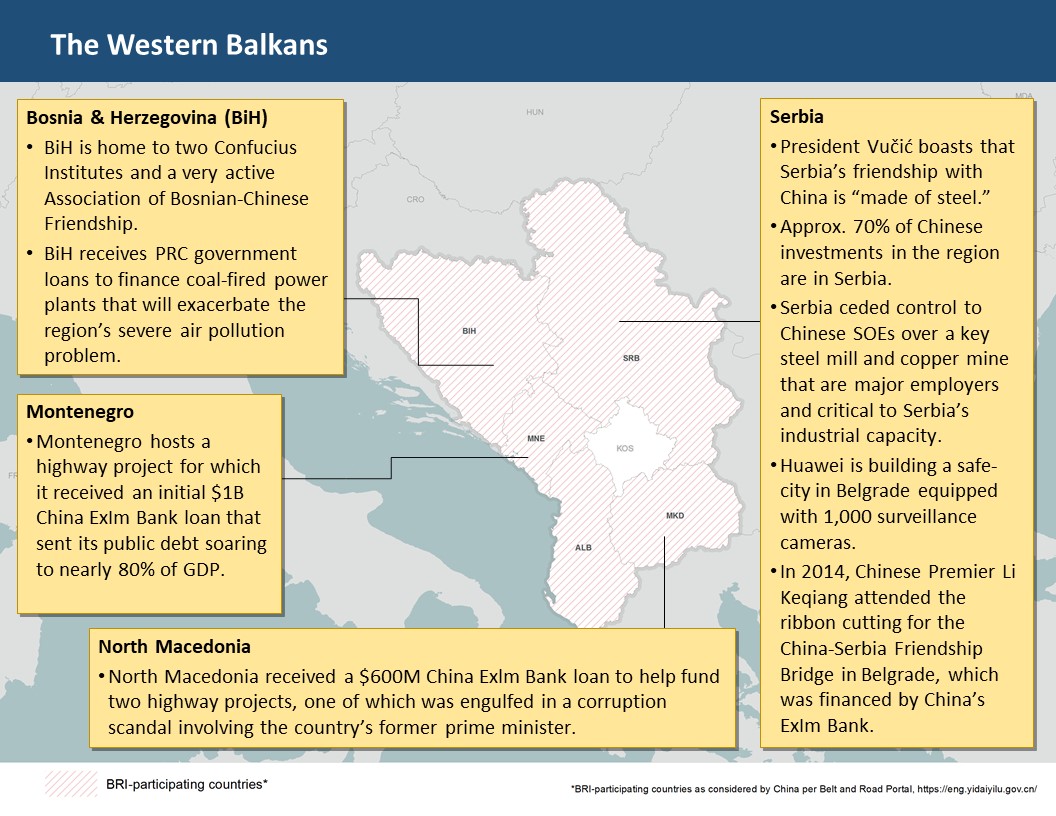
China’s Influence in the Western Balkans:
While the EU remains the main trading partner and investor in the region (and other external actors such as Russia, the U.S., and Turkey maintain significant influence), Beijing is making significant inroads.
The Western Balkans lag behind most of Europe in infrastructure, economic development, and the consolidation of democratic institutions, making them an attractive target for China’s Belt and Road Initiative (BRI). Beijing also does not have to contend with the EU standards and regulations in its business dealings there.
China has a vested interest in seeing infrastructure in the Western Balkans improve so it can transport goods shipped in from Greece’s Port of Piraeus (in which China holds a majority stake) through the region and into the EU’s common market — where Beijing’s real interests lie. Moreover, China’s investments in the Western Balkans are viewed as a means to gain an economic foothold in countries that will eventually join the EU.
Of note, China does not recognize Kosovo’s independence and has limited economic activities there.
China’s Foreign Investment in the Western Balkans:
China on average has invested roughly $1B in the Western Balkans annually since 2011.
Albania, Bosnia and Herzegovina (BiH), Montenegro, North Macedonia, and Serbia have formally joined China’s Belt and Road Initiative.
They are also all members of the 17+1 (now 14+1) framework, a Beijing-initiated platform meant to expand economic and diplomatic cooperation between Beijing and Central/Eastern Europe.
China’s economic footprint in the Western Balkans is mostly comprised of large state-guaranteed loans for transport and energy projects. Loan terms often require at least partial use of Chinese contractors, labor, and supplies.
China’s state-owned enterprises, such as the China Railway International (CRI) and the China Communications Construction Company (CCCC), dominate Beijing’s activities in the region. Recently, the Balkan Investigative Reporting Network identified 136 Chinese-linked projects in the Balkans worth more than €32 billion.
From 2009-2021, Chinese investments in Serbia reached $10.3B, making it the largest recipient in the region.
Debt Trap Diplomacy Concerns:
The majority of China’s financing in the Western Balkans consists of opaque government loans. The concern is debt owed to China may become a tool of influence that Beijing can wield in the region. For example, in 20 years Serbia is projected to hold an estimate of more than $7.9B in Chinese loans.
Projects in the region are not bound by EU standards and regulations, which specifically evaluate the financial sustainability of project.
As of 2018, Montenegro (a NATO member) owes almost 40% of its external debt to China, followed by North Macedonia (also a NATO member) which 20%, BiH with 14%, and Serbia with 12%.
China’s Bar-Boljare highway project in Montenegro is the clearest case of China’s debt trap diplomacy in the region. The $1B loan from China’s Exlm Bank to fund the first part of the project sent Montenegro’s debt-to-GDP ratio soaring to just over 80% in 2019.
Case Study: China’s Security and Law Enforcement Support in Serbia
Except for Serbia, China’s security and law enforcement cooperation in the Western Balkans is limited.
In April 2022, Serbia purchased the Chinese FK-3 surface-to-air defense system, making it the only European country that currently has the Chinese missile system and CH-92A combat drones.
Huawei has signed an agreement to set up its “Safe City ” surveillance equipment in select Serbian cities, including Belgrade, where it is installing 8,000 high-definition cameras with facial-recognition software. This makes Serbia the first European country to purchase such equipment from China.
Serbia is reportedly considering Huawei as a partner in rolling out its 5G network.
- However, in a U.S.-brokered September 4, 2020 commitment to normalize economic relations with Kosovo, Serbia pledged to remove 5G equipment provided by “untrusted vendors” like Huawei from its mobile networks, and to prohibit such vendors from bidding in the future. Meanwhile, Serbia’s cooperation with Huawei in other areas has continued.
Interior ministers from China and Serbia have signed a memorandum of understanding allowing for joint exercises of special police units and cooperation on cybercrime and antiterrorism.
China’s Soft Power in the Western Balkans:
The first Confucius Institute in the Western Balkans was constructed in 2006 in Belgrade. Now, China has established seven Confucius Institutes in the Western Balkans. Confucius Institutes are Chinese-state funded institutions that are embedded in universities throughout the world to promote the PRC’s political agenda.
Beijing has also established a media presence in the region, including Xinhua News Agency and China Global Television Network, which are active in making the case for BRI investments. Beijing also organizes exchange visits for journalists.
Government-friendly Serbian media, echoing the country’s political leadership, often (incorrectly) presents Chinese financing as “gifts,” rather than loans.
China is constructing an eight-story Chinese cultural center in Belgrade on the former site of the Chinese embassy, which was bombed during the 1999 NATO airstrike against Serbia.
Chinese and Western Balkan universities have numerous cooperation agreements. The Chinese Academy of Sciences, for example, engages in scholarly exchanges and joint research in S&T with universities in Serbia, North Macedonia, and Montenegro.
Serbia, BiH, and Albania have visa-free regimes in place with China.
*Last updated: 11/14/2022
###